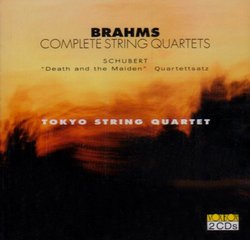| All Artists: Johannes Brahms, Franz [Vienna] Schubert, Tokyo String Quartet Title: Brahms: Complete String Quartets Members Wishing: 0 Total Copies: 0 Label: Vox (Classical) Release Date: 4/24/2001 Genre: Classical Styles: Chamber Music, Historical Periods, Classical (c.1770-1830) Number of Discs: 2 SwapaCD Credits: 2 UPC: 047163517921 |
Search - Johannes Brahms, Franz [Vienna] Schubert, Tokyo String Quartet :: Brahms: Complete String Quartets
 | Johannes Brahms, Franz [Vienna] Schubert, Tokyo String Quartet Brahms: Complete String Quartets Genre: Classical
|
Larger Image |
CD Details |
CD ReviewsAn essential recording March Eliot | Planet Earth | 07/21/2010 (5 out of 5 stars) "I have to add my voice to the reviewers below in recommending this Vox two-fer. It is one of the great classical bargains: five essential chamber music masterpieces given passionate, committed performances by one of world's great string quartets in excellent digital sound, for little more than the price of a happy meal.
Brahms' string quartets are often criticized, even by those who revere Brahms' chamber music, as "problematic" and unsuccessful, due to their straining at self-importance. I couldn't disagree more. Not that these quartets are "light" entertainments. A well-known story has it that Brahms wrote and destroyed 20 quartets before finally publishing the two Opus 51 quartets in C minor and A minor in 1873, and there is indeed a sense of struggle in these pieces, particularly in the outer movements of the first quartet and the finale of the second. But I find both quartets, and the more easy-going third in B flat major, abounding in lovely musical ideas; nor is every movement shot through with struggle: the slow movements of the C minor quartet and the first movement of the A minor are gorgeous and lyrical, as is the whole of the third quartet. Some ensembles do indeed fail to bring out the lyricism of these pieces, lending credence to the conventional view that they are unyieldingly dour and strident in their high seriousness. I hate to name names, but certain performances make me feel that I am not so much listening to this music as being assaulted by it! The Tokyo String Quartet approach these works however with a gorgeous tone that plays up the lush, warm and lyrical side of these quartets, without sacrificing the drama. I would say that--of the performances I have heard--only the Belcea Quartet and the Arcanto Quartet match the TSQ in bringing out the warmth and beauty in the C minor quartet. They say Brahms wrote his quartets in Beethoven's giant shadow, but I hear the influence of Schubert everywhere, so pairing the Brahms quartets with two Schubert quartets was a brilliant idea. The inclusion of the "Quartettsatz," one of Schubert's great unfinished masterpieces, is especially felicitous, because it allows the listener to compare it to the first movement of Brahms' first quartet in C minor. Both quartets, written in the same key, begin with a dramatic opening crescendo as the strings climb over several bars to a climactic high note. (Compare, too, the thrilling opening to Mendelssohn's last quartet in F minor.) I'd say that the performance of "Death and the Maiden" may be (relatively speaking) the one weak link in this set, especially given the intense competition; there are some minor but still noticeable intonation problems in the crucial theme-and-variations movement (built on musical ideas from the Schubert song that gives the quartet its nickname) that keep it from being the best in the class. However, the finale is magnificent, and overall it is a superb performance, one I would rank ahead of the Emerson Quartet (energetic, but tone too thin, too wiry for this Romantic masterpiece) and Kodaly Quartet (surprisingly low-energy--they are so much better in their recording of the Trout); you'll be happy to have this performance as one of several versions in your collection. (My favorite, at least as of this writing, is this one by the Alban Berg Quartet, currently OOP.) Finally, as to the sound: Vox is known for putting out superb recordings by major performers (Alfred Brendel, Walter Klien) in somewhat dated but tolerable sound. The Tokyo Quartet is captured here in excellent digital sound. Early digital to be sure, but without the harsh treble one expects, and with the bass richly present----and while the recording emphasizes blend over individual lines, there's plenty of detail: check out the pizzicato detail in the third movement of Brahms' C minor. I prefer the sound on this CD to that on recent recordings of the Takacs Quartet or Quatuor Ebene, which are perhaps slightly more "transparent" but are also quite harsh and strident in the treble. First movement repeats are omitted in all five quartets, which allows them to fit on two well-filled discs (Disc 1 is 60 minutes; Disc 2 is 80 minutes.)" |

 Track Listings (8) - Disc #1
Track Listings (8) - Disc #1